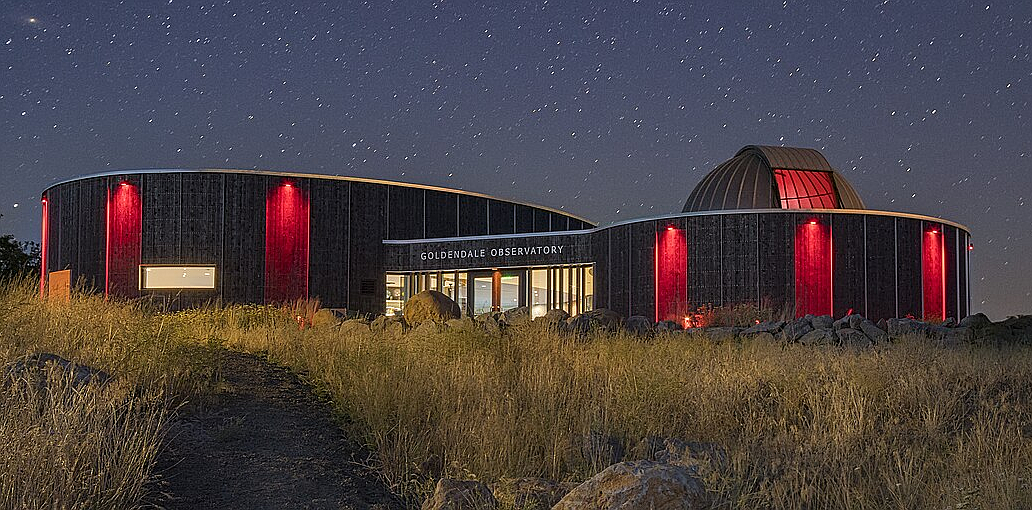Goldendale Observatory Celebrates 50 Years
October 15, 2023 at 9:00 a.m.
Washington’s Goldendale Observatory, perched on the Columbia Plateau, celebrated its golden anniversary on October 14—the same day as the recent annular solar eclipse.
The Goldendale Observatory is a Washington State Park Heritage Site and houses one of the largest publicly accessible telescopes in the nation. The observatory and telescope have attracted hundreds of thousands of sky-watchers since 1973.
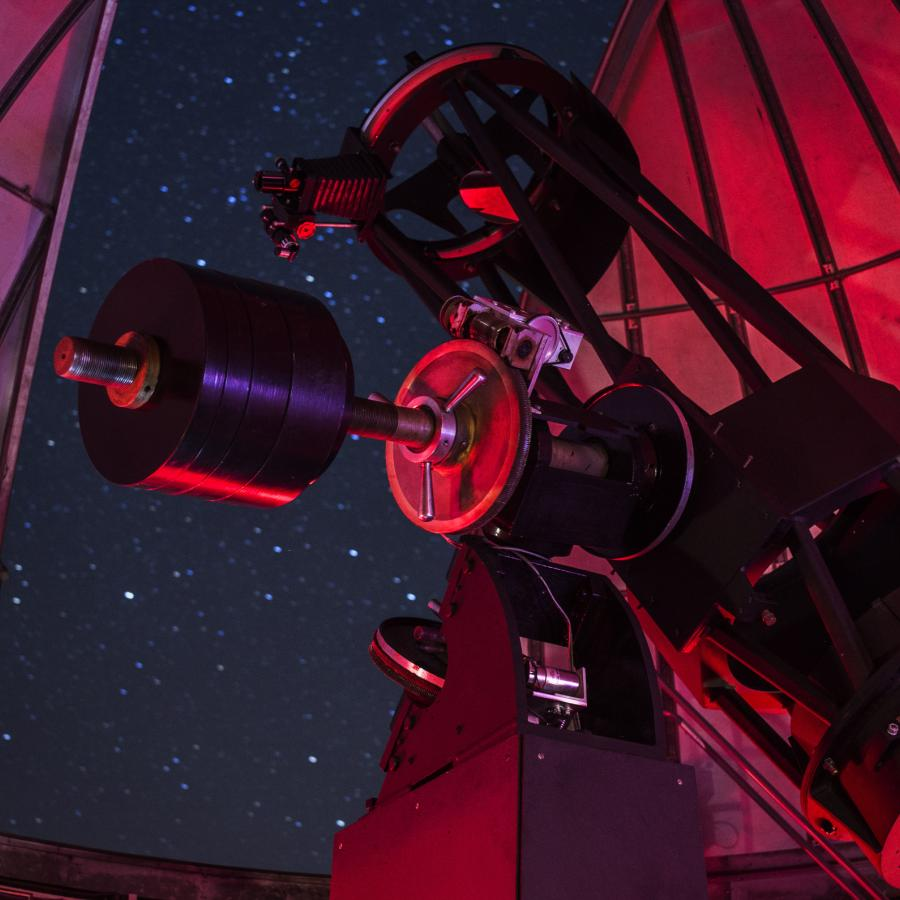 The 24.5-inch telescope at the Goldendale Observatory is one of the largest publicly accessible telescope in the nation, photo courtesy WA State Parks
The 24.5-inch telescope at the Goldendale Observatory is one of the largest publicly accessible telescope in the nation, photo courtesy WA State Parks
History
Over a period of six years in the 1960s, four amateur astronomers (along with help from students and staff at Vancouver’s Clark College) built a 24.5-inch Cassegrain telescope. Vancouver, with its typical western Washington cloudy weather and big-city light pollution, was not a good fit for a serious observatory.
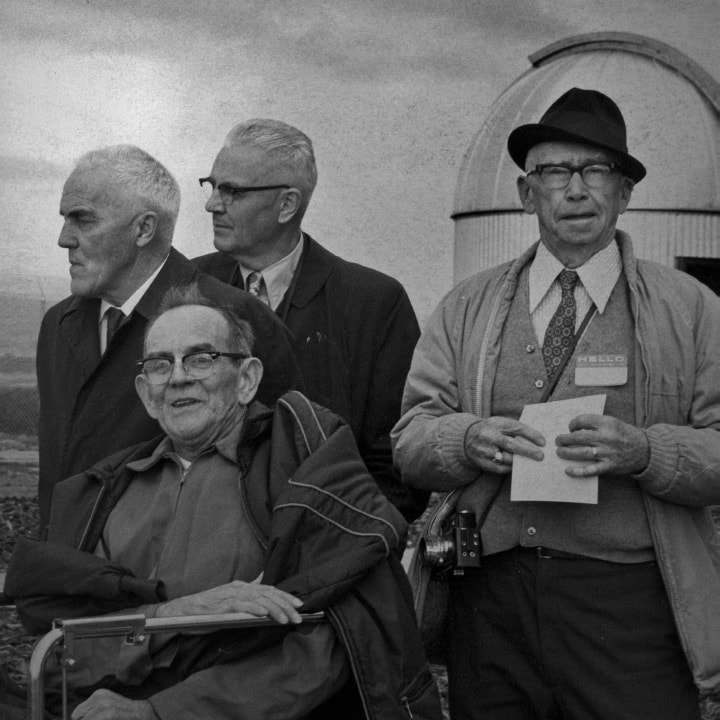 The builders of the famous telescope on opening day, October 13th, 1973. Front: Don Conner. Back, left to right: John Marshall, O.W. VanderVelden, and M.W. McConnell. Photo courtesy GoldendaleObservatory.com.
The builders of the famous telescope on opening day, October 13th, 1973. Front: Don Conner. Back, left to right: John Marshall, O.W. VanderVelden, and M.W. McConnell. Photo courtesy GoldendaleObservatory.com.
The four telescope builders went on scouting trips to find a home for their 24.5-inch baby. A chance stopover at a local diner in Goldendale, with its beautifully dark skies and often clear weather, led to a conversation with a fellow diner, which led them to meet the town’s mayor. Success--hands were shaken. The telescope was donated after the town agreed to build a public science center to house the instrument and work to maintain those beautiful dark skies from light pollution. The building, with its large telescope, opened in October 1973.
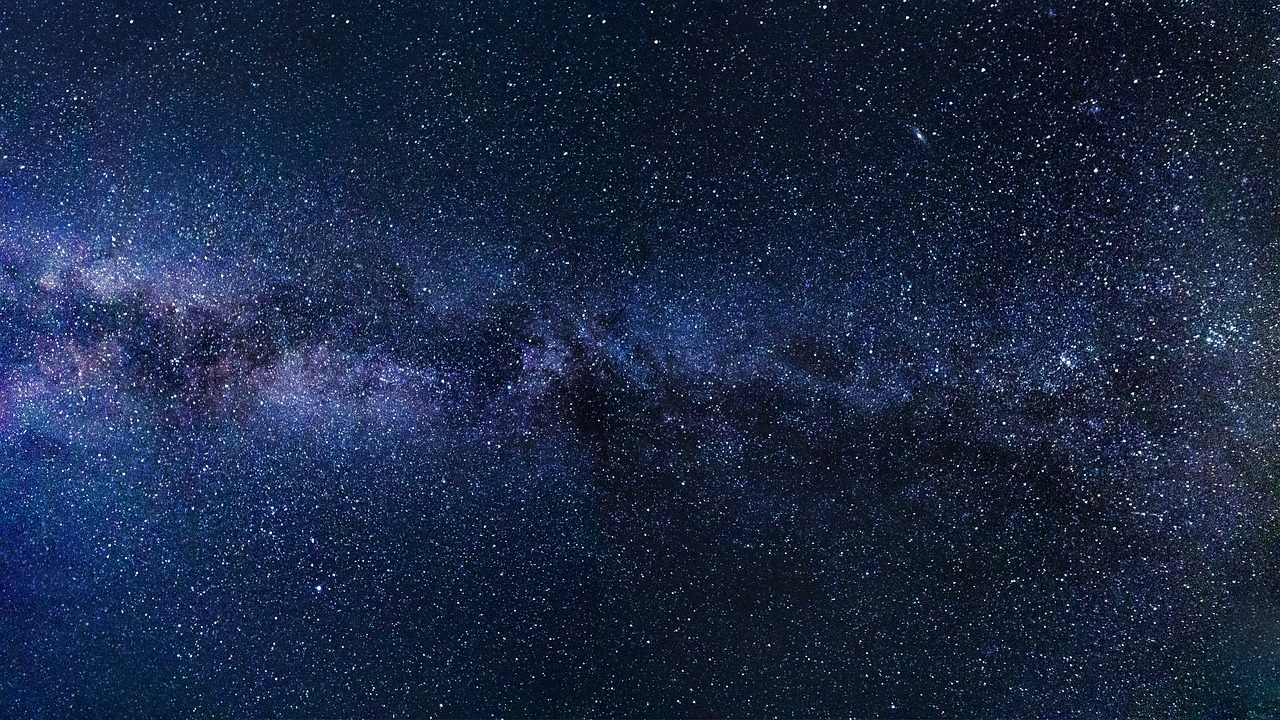 The powerful telescope at the Goldendale Observatory gives the public an up close and personal look at the Milky Way and other heavenly sights. For a gallery of photos from the Goldendale Observatory, visit this link: Gallery
The powerful telescope at the Goldendale Observatory gives the public an up close and personal look at the Milky Way and other heavenly sights. For a gallery of photos from the Goldendale Observatory, visit this link: Gallery
The grand opening of the Observatory was not the first time that Goldendale had been front and center for an astronomical event. In June of 1918, William Wallace Campbell, director of the Lick Observatory in California, visited Goldendale to observe a total solar eclipse. He was part of a team that was using the eclipse to test Einstein’s theory that the sun’s gravity could bend light.
Although the team was unable to get the data they needed because of cloudy weather (and also because Campbell’s gear was stuck in Ukraine due to World War I), Campbell did make some successful calculations on that 1918 trip to Goldendale. At the request of Sam Hill, noted “good road” promoter, monument-builder, and founder of the nearby Maryhill Museum, Campbell calculated the exact spot where the sun would rise during summer solstice at a site near the museum. That information was used as part of Hill’s design for the Stonehenge replica, a memorial he built for Klickitat County men who died during WWI. (As a sidenote, Campbell traveled to Australia in 1922 to observe a total solar eclipse. That program was successful, and the team confirmed Einstein’s theory. Shoot: Washington state came so close to being the location where Einstein’s theory was confirmed.)
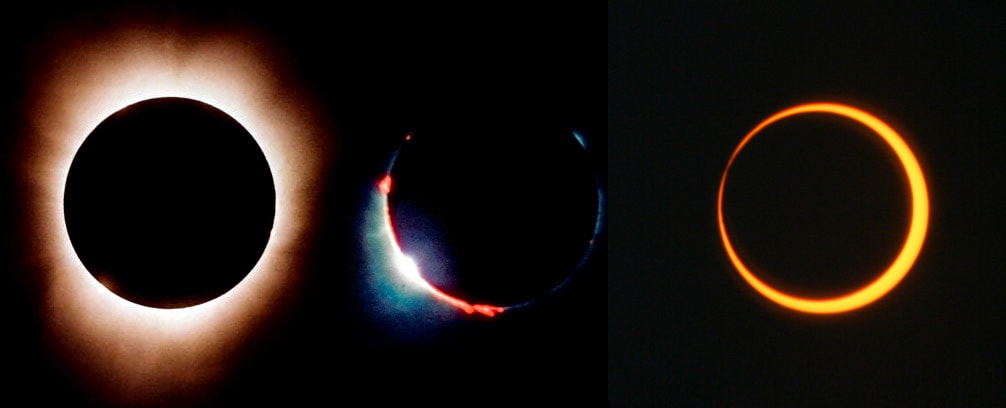 Notable eclipses viewed from Goldendale include (left to right) the 1918 eclipse, the 1979 eclipse, and the October 14, 2023 annular eclipse. Photos courtesy GoldendaleObservatory.com and NASA.
Notable eclipses viewed from Goldendale include (left to right) the 1918 eclipse, the 1979 eclipse, and the October 14, 2023 annular eclipse. Photos courtesy GoldendaleObservatory.com and NASA.
From 1973 through 1980, the Observatory had its ups and downs, primarily because of financial difficulties. But 1979 saw a surge of interest when thousands of visitors arrived for a solar eclipse. That event gave the struggling venture a much-needed financial boost. NBC News even made a donation so that it could broadcast live from the Observatory during the eclipse. Soon enough, though, finances became an issue again, and Washington State Parks acquired the Observatory in 1980, making it one of the largest publicly accessible telescopes in the nation.
Over the years, telescopes have been added at the Observatory, and the primary telescope has been repaired, overhauled, and enhanced. In 2016, it was reconfigured as a Newtonian reflector, which improved the telescope’s ability to serve astrophotography. In 2018, the observatory was temporarily closed when much of the original observatory building was replaced with an expanded facility. During that shutdown, educational programs were relocated to nearby Stonehenge until the upgraded observatory was reopened in 2020 (then closed again during the coronavirus pandemic).
Dark Sky Controversy
In 2010, the International Dark Sky Association awarded the Observatory Dark Sky status, one of the few certified International Dark Sky Parks in thew world, according to the Friends of the Goldendale Observatory. This designation was due to the efforts of long-time Observatory administrator, Steve Stout, along with local amateur astronomers. The Dark Sky status was in keeping with the original agreement given to those four builders of the telescope, who not only wanted an educational science building to house the telescope, but a guarantee from the city and the county on keeping light pollution from affecting the ability to gaze into the heavens from the Observatory.
Who knew this prestigious designation would be the cause of so much trouble, described by some as a “hot button issue.” The Dark Sky designation comes with strict requirements. Turns out anti-regulation activists stepped in, and Washington State Parks said they could not hold up their end of the agreement for dark skies…in part because parks staff cannot “behave in an activist or legislative capacity.” The Dark Sky designation for the Goldendale Observatory was rescinded in 2017.
The Observatory’s website states that efforts to maintain a dark sky continue, with Park, city, local business, and community leaders working to maintain the dark through installation of dimmable LED streetlamps and other activities. The Friends of the Goldendale Observatory group has a different viewpoint on their efforts. To learn more about International Dark Sky Places, visit International Dark Sky Places. To learn more about the dark sky controversy from the viewpoint of “Friends of the Goldendale Observatory,” visit this link: Goldendale-observatory.com.
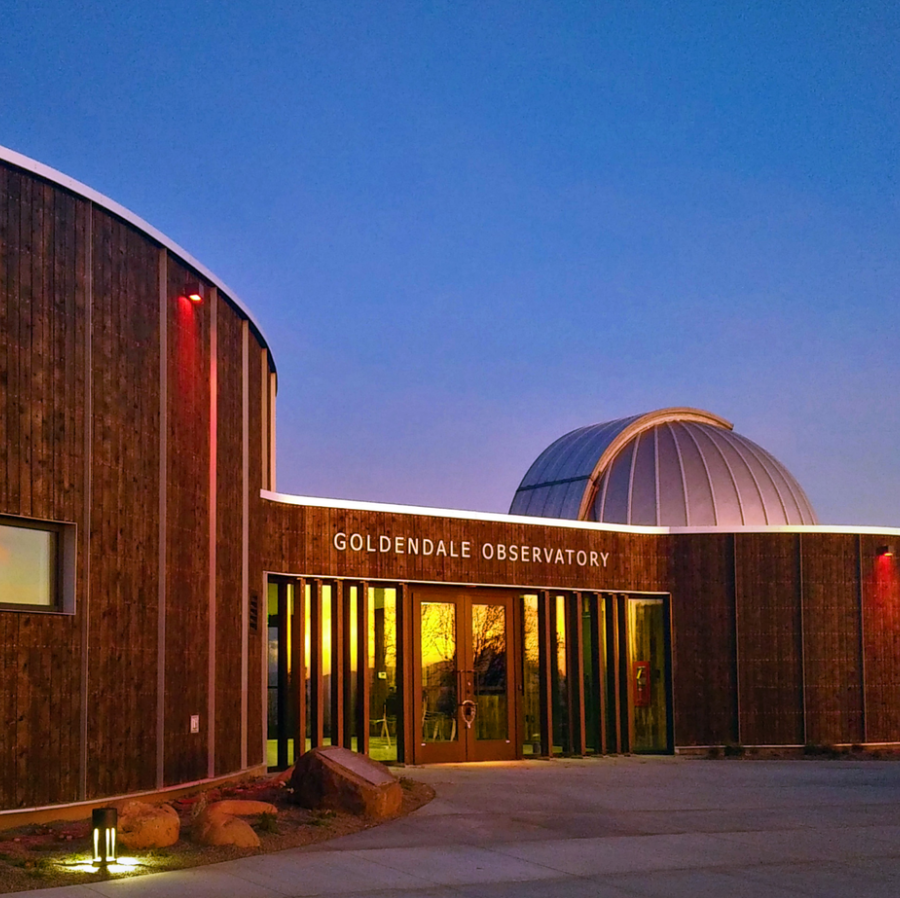 The Goldendale Observatory is a Washington State Parks Heritage Site, photo courtesy WA State Parks
The Goldendale Observatory is a Washington State Parks Heritage Site, photo courtesy WA State Parks
Visiting the Goldendale Observatory
The Goldendale Observatory is located at 1602 Observatory Drive in Goldendale WA (find directions here: Visit Goldendale Observatory)
Winter Hours October through March: Open Friday through Sunday, 2 to 4pm and 7 to 10pm, by appointment only. Space is limited. April 1 through September 30, visiting hours are Thursday through Sunday, 3 to 5pm and 9pm to midnight.
Presentations consist of indoor and outdoor activities, so dress accordingly.
Admission is free during regular schedule, although visitors will need a Washington State Parks Discover Pass to park onsite. The pass is available for purchase at the facility.
The Goldendale Observatory is day-use only and is NOT pet-friendly.
For more information visit these links: Goldendaleobservatory.com or Goldendale Observatory State Park Heritage Site.
Sources for this column include www.goldendaleobservatory.com; Goldendale Observatory State Park Heritage Site; Friends of the Goldendale Observatory; www.HistoryLink.org; Donald W. Meyers’ column in the Yakima Herald-Republic “It Happened Here: Observatory built in Goldendale”
